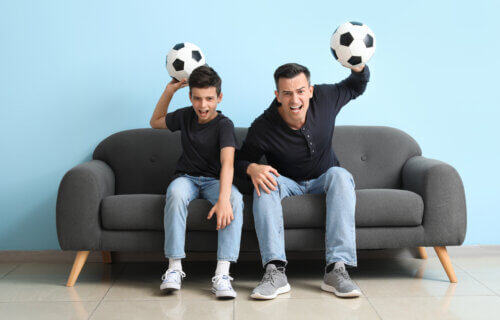ADELAIDE, Australia — Youth sports can be a great way to keep kids active, engaged in the community, and socially stimulated outside the classroom. While it’s key for any athlete to follow the rules of the game, new research finds moms and the dads cheering on their kids from the sidelines need to be mindful of their own behavior too. Scientists at the University of South Australia explain that when certain parents behave badly at youth sporting events, their kids tend to mimic those actions.
Comparing their findings to the old saying “monkey see, monkey do,” study authors uncovered a clear link between parents’ sideline conduct and the behavior of young athletes. More specifically, when parents behaved well (applauding good play, encouraging players, and enjoying the game), their children were more likely to display similarly positive behavior. On the other hand, if a parent behaved poorly (being overly critical, second guessing the referee, yelling), it correlated with greater antisocial behavior among their kids.
These findings are probably relevant to more American families than many may initially assume. Estimates show that roughly 60 million U.S. children play youth sports.
In all, this project assessed the perceptions of 67 Australian youth athletes (ages 12-17) participating in various team-based sports. Researchers asked athletes to report their parents’ positive and negative sideline behaviors, in addition to reporting on their own behaviors on the field.
On a more detailed level, this study focused on five typical negative behaviors and made several key findings:
- 32% of participants reported never seeing any negative behaviors from their parents.
- 69% reported some form of negative behavior from their parents (even if only on rare occasions).
- 18% said their parents “sometimes or often” said bad things about the way they played or performed.
- 17% said their parents “sometimes to very often” yelled at the referee after a bad call.
“Most parents are role models for their children, with children looking to their parents to learn about acceptable behavior. So, it’s natural for them to copy the behaviors they observe,” says UniSA’s Dr. Alyson Crozier, a study co-author, in a media release.
“In our research, we found that when a player perceives positive support from a parent, the player also reported having positive sports attitudes and behaviors. Yet, when a parent engages in antisocial behaviors, their child will more likely behave similarly, potentially as frustration and aggression to their teammates and opponents,” Crozier adds. “Encouragingly, most players in this study reported frequent positive parent behaviors, and negative parent behaviors as rare.”
Dr. Crozier notes that it is her belief that good sportsmanship is the cornerstone of a positive sports experience.
“Children get far more enjoyment from playing sport when a parent is present, encouraging, and supportive. Such behaviors also help build a child’s self-esteem, and improve their life skills and wellbeing,” the study author concludes.
“Yet poor parent behaviors can reduce a player’s confidence and damage their emotional and physiological wellbeing. In some cases, they can even lead to a child withdrawing from a sport altogether. Sport is an important part of life in Australia. If we can encourage respect, sportsmanship, and fun, we can ensure that sport continues to be a positive experience for everyone.”
The research team has four tips to promote more positive parent behavior:
- Be a positive role model for your child – Always be courteous and respectful to coaches, referees, players, and fellow spectators.
- Avoid shouting instructions – Unless you are actually coaching the team, focus on words of encouragement. Don’t ‘coach the coach.’
- Keep comments about your child and other players positive – Regardless of whether you’re at the field, in the car driving home, or at home, avoid bad mouthing other players, parents, coaches, or officials.
- Prioritize fun – Remember, children play sports to have fun and socialize. Winning isn’t everything. Try to have fun yourself, this will help your child by creating positive memories.
The study is published in the journal Frontiers in Sports and Active Living.
